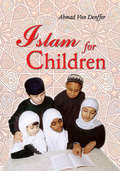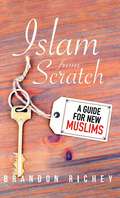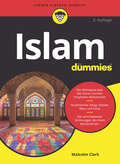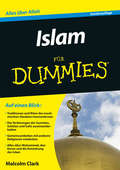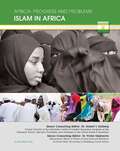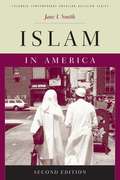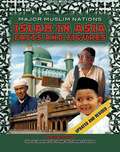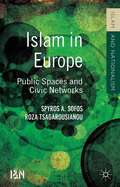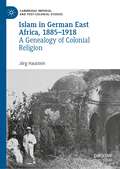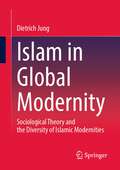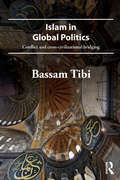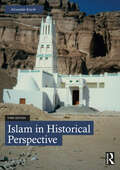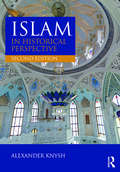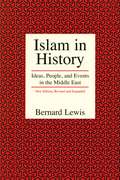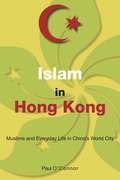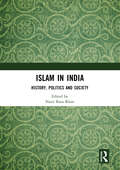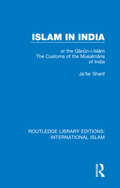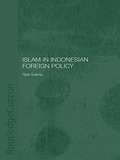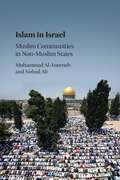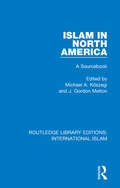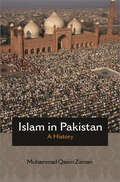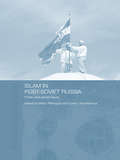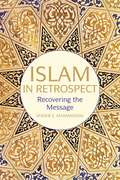- Table View
- List View
Islam for Children
by Ahmad Von DenfferThis popular classic is a must for all Muslim children, parents, and teachers. It covers the lives of the Prophets, faith, prayer, fasting, charity, pilgrimage, morals, and manners. Learning by doing is emphasized, with plenty of fun things to do for kids 6-12 years: picture puzzles, crossword puzzles, games, coloring, and crafts, making learning about Islam enjoyable and educational. Originally published in Germany, it has already been used successfully in both Muslim homes and weekend classes. The English version has been revised and carries new illustrations. Ahmad Von Denffer was born in Germany in 1949. He studied Islamics and Social Anthropology at the Universty of Mainz, where he also attended additional courses in the Department of Missiology. His special interests include Christian-Muslim relations. He has made a number of contributions to scholarly journals and has several publications to his credit. He joined the Islamic Foundation as Research Fellow in 1978 and is presently working with the Islamic Centre, Munich.
Islam from Scratch: A Guide for New Muslims
by Brandon RicheyIslam in practice can often seem opaque to the outside viewer. New Muslims and non-Muslims alike look on as believers offer salah, attend Friday prayer, wear the hijab, and fast during Ramadan, not knowing the particulars of why or how these acts of worship are performed. If you are a new Muslim, or just a curious observer wanting to know more about Islam, then this book is for you.Islam From Scratch attempts to bridge this wide gap in knowledge, helping readers understand the Islamic faith step by step, chapter by chapter. For new Muslims, this book hopes to provide you with the most critical information when taking your first steps into the faith in a way that won't overwhelm you. By the end, hopefully you will not only understand your newfound belief and the intricacies that thread it, but also appreciate the rituals and history that come with it.
Islam für Dummies (Für Dummies)
by Malcolm ClarkÜber 1,8 Milliarden Muslime leben auf allen Kontinenten. Doch was wissen wir über ihren Glauben? Häufig kaum mehr, als dass der Koran ihre heilige Schrift ist, Gläubige fünf Mal am Tag beten und sie zum Ramadan fasten. Dieses Buch ändert das. Malcolm Clark erzählt vom Leben des Propheten Mohammed, berichtet über die Entwicklung seiner Lehre über die Jahrhunderte und erklärt die Bedeutung des Koran. Er zeigt auf, welche Beiträge Muslime in den Naturwissenschaften, der Kunst und der Architektur geleistet haben. So hilft er, Vorurteile abzubauen und muslimische Mitbürger besser zu verstehen.
Islam für Dummies: Entdecken Sie Den Islam. Die Riten Und Die Geschichte (Für Dummies)
by Malcolm ClarkÜber 1,3 Milliarden Muslime leben auf allen Kontinenten. Doch was wissen wir über ihren Glauben? Kaum mehr, als dass der Koran ihre heilige Schrift ist, Gläubige fünf Mal am Tag zu Allah beten und sie zum Ramadan fasten. Aber wer kann schon den Unterschied zwischen Schiiten und Sunniten erklären und wer weiß, was es mit den mystischen Sufi auf sich hat? Malcolm Clark erzählt vom Leben des Propheten Mohammed, berichtet über die Ausbreitung seiner Lehre und deren Entwicklung über die Jahrhunderte und erklärt die Bedeutung des Koran. Er beschreibt das Leben der Muslime und zeigt auf, welche Beiträge sie in den Naturwissenschaften, der Kunst und der Architektur geleistet haben.Er hilft so, Vorurteile zu vermeiden und muslimische Mitbürger besser zu verstehen.
Islam in Africa (Africa: Progress and Problems #13)
by Hal MarcovitzIslam is considered the worlds fastest-growing religion, and today more than 420 million Africans follow the Islamic faith. Since Islam was introduced to the continent during the seventh century a.d., it has had a profound political and cultural influence on Africa. This book traces the historical spread of Islam throughout Africa. It also examines current issues and controversies surrounding the Muslim faith in Africa, including fundamentalist interpretations of Islam, efforts to impose Islamic law in countries with mixed Muslim and non-Muslim populations, and religious-based violence.
Islam in America (Columbia Contemporary American Religion Series)
by Jane SmithThis richly textured, critically acclaimed portrait of American Muslims introduces the basic tenets of the Muslim faith, surveys the history of Islam in North America, and profiles the lifestyles, religious practices, and worldviews of Muslims in the United States. The volume focuses specifically on the difficulty of living faithfully and adhering to tradition while adapting to an American way of life and addresses the role of women in Muslim culture, the raising and education of children, appropriate dress and behavior, and incidences of prejudice and unfair treatment. The second edition of Islam in America features a new chapter on post-9/11 realities, which covers infringements on civil rights and profiling, participation in politics, transformations in Islamic law, pluralism and identity issues, foreign influences, anti-Islamic sentiment, intra-Islamic tensions, and the quest for a moderate Islam. Source notes, glossary, and additional resources also reflect recent developments and scholarship.
Islam in Asia: Facts and Figures
by Dorothy KavanaughMany Westerners associate Islam primarily with the Middle East. But in fact, four countries have larger Muslim populations than Egypt, the largest Arab state. Those four countries-Indonesia, Pakistan, India, and Bangladesh-all like within Asia. This volume presents a wealth of statistical and background information on more than 20 Asian nations with significant Muslim populations. The book also provides a valuable overview of the Islamic faith and chronicles the history of Islam's spread into Asia.
Islam in Europe
by Spyros A. Sofos Roza TsagarousianouDrawing upon extensive fieldwork and suggesting novel ways of approaching the phenomenon of European Islam and the continent's Muslim communities, Islam in Europe examines how European Muslims construct notions or identity, agency and belonging, how they negotiate and redefine the notions of religion, tradition, authority and cultural authenticity.
Islam in German East Africa, 1885–1918: A Genealogy of Colonial Religion (Cambridge Imperial and Post-Colonial Studies)
by Jörg HausteinIn this rich and multi-layered deconstruction of German colonial engagement with Islam, Jörg Haustein shows how imperial agents in Germany’s largest colony wielded the knowledge category of Islam in a broad set of debates, ranging from race, language, and education to slavery, law, conflict, and war. These representations of ‘Mohammedanism’, often invoked for particular political ends, amounted to a serious misreading of Muslims in East Africa, with significant long-term effects. As the first in-depth account of the politics of Islam in German East Africa, the book makes an essential contribution to the history of religion in Tanzania before British rule. It also offers a template for re-reading the colonial archive in a manner that recovers Muslim agency beyond a European paradigm of religion.
Islam in Global Modernity: Sociological Theory and the Diversity of Islamic Modernities
by Dietrich JungThis book combines sociological theorising with studies on the Middle East and Islam. The diversity of modernities that can be observed in our world is linked to the claim of living in a global modernity, in a world society. The book underpins this claim with numerous excursions into Islamic history. It criticises the view that modernisation can be equated with westernisation and considers different projects of specifically Islamic modernities as integral parts of world society. From this perspective, the study contributes to the "provincialisation" of European history in contemporary social scientific thought. Contrary to the theories of postcolonialism associated with the call for the provincialisation of Europe, however, this book adheres to essential traditions of classical sociology. It thus aims to make a contribution to the social theoretical discussion on modernity, which is empirically underpinned with the help of data from the history of the Middle East and Islam.
Islam in Global Politics: Conflict and Cross-Civilizational Bridging
by Bassam TibiReaching beyond traditionally politicised scholarship to provide a unique perspective on the place of religion and culture in global and local politics, this book examines the impact of Islam on 'civilizational' relations between different groups and polities. Bassam Tibi takes a highly original approach to the topic of religion in world politics, exploring the place of Islam in society and its frequent distortion in world politics to the more radical Islamism. Looking at how this becomes an immediate source of tension and conflict between the secular and the religious, Tibi rejects the 'clash of civilizations' theory and argues for the revival of Islamic humanism to help bridge the gap. Chapters expand on: inter-civilizational conflict in global politics dialogue between religious and secular, East and West western concepts of Islamism euro-Islam and the Islamic diaspora in Europe Islamic humanism as a tool for bridging civilizations. Shedding new light on the highly topical subject of Islam in politics and society, this book is an essential read for scholars and students of international politics, Islamic studies and conflict resolution.
Islam in Historical Perspective
by Alexander KnyshIslam in Historical Perspective is a general introduction to Islam and the history of Muslim societies. Richly illustrated by quotations and images from Muslim scripture, historical chronicles, artistic works, and theological and juridical treatises, it invites the reader to examine this evidence and to form a comprehensive understanding of Islam’s evolution from its inception in Arabia to the present day.Combining chronological and thematic principles, this book examines Muslims’ political and intellectual struggles over the meaning and practical implications of their faith. Treating Islam as a language that various factions and generations of Muslims have used to express their grievances, aspirations, and personal experiences and preferences, the book shows the religion’s remarkable potency as a social, political, and cultural force and source of identity. It also describes and analyses Muslim devotional practices, emotional responses to the revelation, artistic and intellectual creativity, and patterns of everyday existence. The goal of this book is to help the reader to develop personal empathy for the subject by showing the relevance of the dilemmas faced by Muslims in different epochs and geographical locations to the burning issues of today’s world. A thorough analysis of pivotal events, trends, and personalities of Islamic history is accompanied by witness accounts showing how they were perceived by Muslims themselves.This new edition features a thoroughly revised text, updated bibliography, new illustrations, study questions and chapter summaries, and is an outstanding resource for students of Islam and Muslim civilization.
Islam in Historical Perspective: International Student Edition
by Alexander KnyshIslam in Historical Perspective provides readers with an introduction to Islam, Islamic history and societies with carefully selected historical and scriptural evidence that enables them to form a comprehensive and balanced vision of Islam’s rise and evolution across the centuries and up to the present day. Combining historical and chronological approaches, the book examines intellectual dialogues and socio-political struggles within the extraordinary rich Islamic tradition. Treating Islam as a social and political force, the book also addresses Muslim devotional practices, artistic creativity and the structures of everyday existence. Islam in Historical Perspective is designed to help readers to develop personal empathy for the subject by relating it to their own experiences and burning issues of today. It contains a wealth of historical anecdotes and quotations from original sources that are intended to emphasize its principal points in a memorable way. This new edition features a thoroughly revised and updated text, new illustrations, expanded study questions and chapter summaries.
Islam in History
by Bernard LewisFrom secular-minded autocrats like Saddam Hussein to religious fundamentalists like Osama bin Laden, powerful voices in the Islamic world have been united by a fierce hatred of the West. If we want to know why they think the way they do, we have to understand the history of Islam and its continuous interactions with the West.This masterly collection of essays by a leading expert on Islam and the Middle East ranges over the whole sweep of Islamic history and Western attempts to comprehend it.
Islam in Hong Kong
by Paul O'ConnorMore than a quarter of a million Muslims live and work in Hong Kong. Among them are descendants of families who have been in the city for generations, recent immigrants from around the world, and growing numbers of migrant workers. Islam in Hong Kong explores the lives of Muslims as ethnic and religious minorities in this unique post-colonial Chinese city. Drawing on interviews with Muslims of different origins, O'Connor builds a detailed picture of daily life through topical chapters on language, space, religious education, daily prayers, maintaining a halal diet in a Chinese environment, racism, and other subjects. Although the picture that emerges is complex and ambiguous, one striking conclusion is that Muslims in Hong Kong generally find acceptance as a community and do not consider themselves to be victimised because of their religion.
Islam in India: History, Politics and Society
by Nasir Raza KhanIslam in India: History, Politics and Society is based on the historical and contemporary relevance of the religion and its related culture(s) in India. Besides being a major religious doctrine, Islam has been the main political ideology for many dynasties in India such as Delhi Sultanate (1206-1451); the Illbaris Turks (also known as Mamluk 1206–90); Khiljis (1290–1320); Tughlaqs (1320–1414); Sayyids (1414–51), Afghans and the Mughal Empire. Islam played a pivotal role in shaping the polity and society during the period of each dynasty. This book argues that Islam in India ought to be seen not only as a political and religious ideology of the dynasties, but also as a significant force that shaped the cultural fabric of the country. Print edition not for sale in South Asia (India, Sri Lanka, Nepal, Bangladesh, Pakistan and Bhutan)
Islam in India: or the Qᾱnῡn-i-Islᾱm The Customs of the Musalmᾱns of India (Routledge Library Editions: International Islam #5)
by Ja'far SharifFirst published in 1832, this work was at the time considered an authoritative account of the beliefs and practices of the Musalmᾱns of India. This 1921 reprint includes an introduction from the editor, Dr William Crooke, which presents what is known about both Ja’far Sharif and the translator, G. A. Herklots. It also distinguishes the original material from the changes made by the translator and compares the book with other similar works published in the nineteenth-century. This book will be of interest to those studying the history of Islam, the history of ethnography and the British Empire.
Islam in Indonesian Foreign Policy: Domestic Weakness and the Dilemma of Dual Identity (Politics In Asia Ser.)
by Rizal SukmaThis companion volume to the highly successful Islam in Malaysian Foreign Policy explores the extent to which foreign policy in the world's largest Muslim nation has been influenced by Islamic considerations.
Islam in Israel: Muslim Communities in Non-Muslim States
by Nohad Ali Muhammad Al-AtawnehIslam is the religion of the majority of Arab citizens in Israel and since the late 1970s has become an important factor in their political and socio-cultural identity. This leads to an increasing number of Muslims in Israel who define their identity first and foremost in relation to their religious affiliation. By examining this evolving religious identity during the past four decades and its impact on the religious and socio-cultural aspects of Muslim life in Israel, Muhammad Al-Atawneh and Nohad Ali explore the local nature of Islam. They find that Muslims in Israel seem to rely heavily on the prominent Islamic authorities in the region, perhaps more so than minority Muslims elsewhere. This stems, inter alia, from the fact that Muslims in Israel are the only minority that lives in a land they consider to be holy and see themselves as a natural.
Islam in Liberalism
by Joseph A. MassadIn the popular imagination, Islam is often associated with words like oppression, totalitarianism, intolerance, cruelty, misogyny, and homophobia, while its presumed antonyms are Christianity, the West, liberalism, individualism, freedom, citizenship, and democracy. In the most alarmist views, the West's most cherished values--freedom, equality, and tolerance--are said to be endangered by Islam worldwide. Joseph Massad's Islam in Liberalism explores what Islam has become in today's world, with full attention to the multiplication of its meanings and interpretations. He seeks to understand how anxieties about tyranny, intolerance, misogyny, and homophobia, seen in the politics of the Middle East, are projected onto Islam itself. Massad shows that through this projection Europe emerges as democratic and tolerant, feminist, and pro-LGBT rights--or, in short, Islam-free. Massad documents the Christian and liberal idea that we should missionize democracy, women's rights, sexual rights, tolerance, equality, and even therapies to cure Muslims of their un-European, un-Christian, and illiberal ways. Along the way he sheds light on a variety of controversial topics, including the meanings of democracy--and the ideological assumption that Islam is not compatible with it while Christianity is--women in Islam, sexuality and sexual freedom, and the idea of Abrahamic religions valorizing an interfaith agenda. Islam in Liberalism is an unflinching critique of Western assumptions and of the liberalism that Europe and Euro-America blindly present as a type of salvation to an assumingly unenlightened Islam.
Islam in North America: A Sourcebook (Routledge Library Editions: International Islam #2)
by Michael A. Kőszegi and J. Gordon MeltonFirst published in 1992, this book focuses on the Muslim community and how it has developed in North America. Divided into eight sections, it traces the history of the Muslim community in North America from the nineteenth century to the end of the twentieth-century and examines different aspects of the community such as Sectarian Movements, Islam in the African American community and points of contact between Christian and Islamic communities. The text includes a number of bibliographies to aid further study and closes with a helpful directory of Muslim organizations and centers in North America. This book will be of particular interest to those studying Islam and Religion in North America.
Islam in Pakistan: A History (Princeton Studies in Muslim Politics #68)
by Muhammad Qasim ZamanThe first book to explore the modern history of Islam in South AsiaThe first modern state to be founded in the name of Islam, Pakistan was the largest Muslim country in the world at the time of its establishment in 1947. Today it is the second-most populous, after Indonesia. Islam in Pakistan is the first comprehensive book to explore Islam's evolution in this region over the past century and a half, from the British colonial era to the present day. Muhammad Qasim Zaman presents a rich historical account of this major Muslim nation, insights into the rise and gradual decline of Islamic modernist thought in the South Asian region, and an understanding of how Islam has fared in the contemporary world. Much attention has been given to Pakistan's role in sustaining the Afghan struggle against the Soviet occupation in the 1980s, in the growth of the Taliban in the 1990s, and in the War on Terror after 9/11. But as Zaman shows, the nation's significance in matters relating to Islam has much deeper roots. Since the late nineteenth century, South Asia has witnessed important initiatives toward rethinking core Islamic texts and traditions in the interest of their compatibility with the imperatives of modern life. Traditionalist scholars and their institutions, too, have had a prominent presence in the region, as have Islamism and Sufism. Pakistan did not merely inherit these and other aspects of Islam. Rather, it has been and remains a site of intense contestation over Islam's public place, meaning, and interpretation. Examining how facets of Islam have been pivotal in Pakistani history, Islam in Pakistan offers sweeping perspectives on what constitutes an Islamic state.
Islam in Post-Soviet Russia: Public And Private Faces
by Hilary Pilkington Galina YemelianovaThis book, based on extensive original research in the field, analyses the political, social and cultural implications of the rise of Islam in post-Soviet Russia. Examining in particular the situation in Tatarstan and Dagestan, where there are large Muslim populations, the authors chart the long history of Muslim and orthodox Christian co-existence in Russia, discuss recent moves towards greater autonomy and the assertion of ethnic-religious identities which underlie such moves, and consider the actual practice of Islam at the local level, showing the differences between "official" and "unofficial" Islam, how ceremonies and rituals are actually observed (or not), how Islam is transmitted from one generation to the next, the role of Islamic thought, including that of radical sects, and Islamic views of men and women's different roles. Overall, the book demonstrates how far Islam in Russia has been extensively influenced by the Soviet and Russian multi-ethnic context.
Islam in Post-Soviet Uzbekistan
by Johan RasanayagamIn recent years, the Uzbekistan government has been criticized for its brutal suppression of its Muslim population. This book, which is based on the author's intimate acquaintance with the region and several years of ethnographic research, is about how Muslims in this part of the world negotiate their religious practices despite the restraints of a stifling authoritarian regime. Fascinatingly, the book also shows how the restrictive atmosphere has actually helped shape the moral context of peoples' lives, and how understandings of what it means to be a Muslim emerge creatively out of lived experience.
Islam in Retrospect: Recovering the message
by Maher S. MahmassaniRENEWING OUR UNDERSTANDING OF ISLAM IN TODAY'S WORLD
